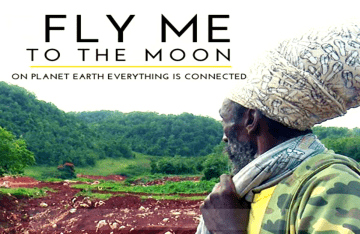
CARGC-CDCS Symposium Film Screening: Fly Me to the Moon
- Virtual Event
"Fly Me to the Moon" is a documentary film directed by Esther Figueroa and Mimi Sheller.
Fly Me to the Moon will be screened during April 27-28 as a part of the month-long CARGC-CDCS Symposium, "Building Solidarity in the Anthropocene: Approaches to Infrastructure, Environment, and Global Communication." Each week of April, we will provide access to a different documentary film which explores relationships among technology, infrastructure, environment. The Symposium will conclude with a filmmaker discussion on Friday, April 29. Please see below for the detailed Symposium description.
Download the Symposium program
About the Film
Fly Me to the Moon (2019) is a feature documentary by Jamaican independent filmmaker Esther Figueroa, that takes us on a journey into the unexpected ways we are all connected on Planet Earth, by following aluminum – the metal of modernity – around the world and into space. We travel for over one hundred years, visiting places as far flung as the Moon, Jamaica, India, Suriname, Canada, Cuba, Japan, Hungary, Iceland, Australia, Vietnam, the United States of America, encountering along the way human triumphs, technological innovations, multiple wars, societal upheavals, environmental devastation. And in the urgent here and now of the climate crisis, the film challenges us to think about the consequences of our consumption, to reimagine the ways in which we live, and to change our material culture and political economy that is destroying the planet we all depend on.
Link to register for the film screening on April 27-28
About the Filmmakers
Esther Figueroa is a Jamaican independent film maker, writer, educator, and linguist with over thirty five years of media productions. Her activist filmmaking gives voice to those outside of mainstream media and focuses on the perpetuation of local and indigenous knowledge and cultures, the environment, social injustice, and community empowerment. Her films are screened and televised all over the world and taught at numerous universities.
Mimi Sheller is Professor of Sociology and the Dean of The Global School at the Worcester Polytechnic Institute. Dr. Sheller has published more than 125 articles and book chapters, and is the author or co-editor of fifteen books, including Advanced Introduction to Mobilities (Edward Elgar, 2021) and Island Futures: Caribbean Survival in the Anthropocene (Duke University Press, 2020).
Have questions for the filmmakers?
Please submit your questions/comments about any of our featured films in advance. We will share them with filmmakers and respond during Q&A at the closing discussion with filmmakers on Friday, April 29.
This film screening is co-sponsored by the Center of Experimental Ethnography (CEE) and the Collective for Advancing Multimodal Research Arts (CAMRA) at the University of Pennsylvania.
About the Series
"Building Solidarity in the Anthropocene: Approaches to Infrastructure, Environment, and Global Communication"
Oceans rise. Trees burn. Shales fracture. Mines pollute. Viruses spread. Cities under lockdown. Infrastructures attack. Ecologies go feral…. We are in an era where infrastructures and environments are ever closely intersected on a global scale. How to make sense of the different but intersecting logics, networks, and poetics of infrastructures and environments? What critical roles do media and mediation play in shaping the anthropocene, both in the Global South and North? At the 2022 CARGC-CDCS Spring Symposium, we invite speakers to discuss how they address these important questions in their respective works.
The 2022 Symposium will bring together leading scholars, artists, activists, journalists, and other experts to collaboratively envision our shared futures. Speakers will share their research and multi-modal works from wide-ranging and multidisciplinary perspectives. The main topics of discussion include resource extraction, decolonial practices, politics of environment, urban infrastructure, environmental racism, trans-oceanic supply chains, and communication infrastructures amidst global health emergencies. We envision each roundtable as a generative space for open dialogues and critical reflections. Our month-long Symposium will also feature filmmakers and their works which explore the relationships among technology, infrastructure, environment, and affected communities. Their films will be made available for online screening (access with codes) during the Symposium month. Our Symposium month will conclude with a cross-panel discussion about this year’s overarching themes and our featured films.
Events
View AllDisclaimer: This event may be photographed and/or video recorded for archival, educational, and related promotional purposes. We also may share these video recordings through Annenberg's website or related platforms. Certain events may also be livestreamed. By attending or participating in this event, you are giving your consent to be photographed and/or video recorded and you are waiving any and all claims regarding the use of your image by the Annenberg School for Communication. The Annenberg School for Communication, at its discretion, may provide a copy of the photos/footage upon written request.
